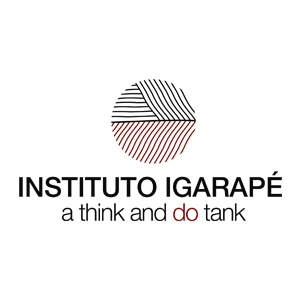From deliberation to implementation: in New York, Igarapé Institute reinforces the need to strengthen global cooperation and include environment in global climate and development agendas
Discussions, platforms, and agreements established during Climate Week must be connected to future global milestones, including the G20 and COP30 in Brazil
Rio de Janeiro, October 3, 2024 – As it happens every year, New York once again hosted Heads of State, diplomats, experts, private sector leaders, and civil society organizations around high-level events within the framework of the United Nations General Assembly (UNGA) and New York Climate Week. This year, however, was also marked by the holding of the Summit of the Future (SOTF) and a G20 meeting at the UN headquarters, to which Brazil invited all Member States of the Organization.
One of the main highlights this year was the consensus adoption of the Pact for the Future, during the SOTF, pointed out as an opportunity to reinforce commitments and reshape international institutions in a context of political fragmentation and multiple crises. The importance of reforming the UN Security Council was also emphasized by various leaders, including the Brazilian president.
Igarapé Institute, the only Brazilian organization that participated in the entire process of Our Common Agenda, which culminated in the SOTF, played an active role in the events, reinforcing its role as an interlocutor in high-level global discussions on multilateralism, nature, climate finance, and inclusive global governance. The organization sought to connect these discussions with the agendas and priorities of future events, such as the G20 Leaders’ Summit and the Climate Conferences (COP) to be held in Azerbaijan and Brazil, emphasizing the importance of integrating nature into climate and development agendas – an aspect still underrepresented in global debates – and the crucial leadership of the Global South countries in this process.
“Transforming the international system is not an easy task. It will require both leadership and political momentum, especially from countries of the Global South or the Global Majority, which are still underrepresented in the decision-making processes that affect everyone. The implementation of the actions discussed at the global level also needs to be done at regional and local levels, across the planet,” highlighted Ilona Szabó, co-founder and president of the Igarapé Institute and the only Latin American member of the High-Level Advisory Board (HLAB) on Effective Multilateralism of the UN Secretary-General.
The critical situation of the Amazon was another central point in the discussions. On this topic, Szabó warned that “without the Amazon Rainforest, there is no way to maintain the 1.5°C global warming limit. Brazil hosts 60% of the Amazon biome, which is a critical carbon sink, and we face years of record deforestation. Now, we are also dealing with fires. Some parts of the Amazon are at risk of collapse, and this is very concerning.”
Continuing on this topic, she advocated for the need to develop and implement sustainable economic models that preserve the biome: “We need alternatives to destruction and economies that are compatible with the standing forest and that bring well-being to the people. The social progress index in the Amazon is much lower than the rest of Brazil. This is unacceptable, given what we know about the riches of this region.”
The president of the Igarapé Institute also highlighted the need for financiers – Multilateral Development Banks, private investors, or even philanthropies – to incorporate a territorial risk perspective in their investments: “We are developing guidelines to reduce the impact of territorial risks from investments, ensuring the protection of people and that we do not harm nature while promoting development or climate transition. We can no longer continue causing damage to our territories and their peoples.”
For ten days, Igarapé Institute also participated in debates on planetary stability, emphasizing the need to use systemic approaches to combat inequalities and tackle climate change and biodiversity loss. The Institute presented three central points for this transformation: energy inclusion; nature-based solutions; and territorial protection to offer people sustainable economic alternatives to the informal and illegal economies that destroy biomes. In this sense, Igarapé, with the support of the Arapyaú Institute and Itausa, promoted discussions about the “Green Bridge Facility,” an initiative aimed at unlocking responsible investments, scaling up green enterprises, achieving zero deforestation, and promoting the well-being of local communities in Brazil and throughout the Amazon Basin.
The organization will continue working to advance discussions on multilateralism, financing, and governance for climate and nature, connecting these agendas with major global benchmarks and forums. The organization emphasizes the need for concrete and collaborative actions among governments, international organizations, private sector, and civil society to address the challenges of the current global polycrisis. Much has been discussed, and now it is crucial that these discussions translate into implementation and action at the upcoming events.
More information: raphael.lima@igarape.org.br (+55 21 965559019) / press@igarape.org.br
About the Igarapé Institute
The Igarapé Institute is an independent think-and-do tank that conducts research, develops solutions, and establishes partnerships with the aim of influencing both public and corporate policies and practices in overcoming major global challenges. Our mission is to contribute to public, digital, and climate security in Brazil and worldwide. Igarapé is a non-profit and non-partisan institution, based in Rio de Janeiro, operating from the local to the global level.



